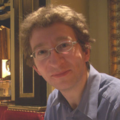
Protein Superglues to control cells and protect from outbreak threats Professor Mark Howarth (University of Cambridge) presents his work on on protein engineering as an approach for disease prevention and therapy. Hosted by Professor Gavin Wright.
Event details
Abstract
Many properties of antibodies and other binding proteins are limited by dissociation. A special feature of the bacterium Streptococcus pyogenes enables spontaneous locking together of its surface proteins. Our lab re-engineered this system to generate an irreversible peptide-protein interaction (SpyTag/SpyCatcher). This superglue is genetically-encodable and specific in diverse biological environments. We accelerated reactivity to the diffusion limit and generated variants switchable by light, pH or temperature. SpyTag allows rapid reformatting of antibodies with reporters or effector molecules. SpyTag and its related superglue SnoopTag allow programmable synthesis of antibody/nanobody teams for multiplex control of cell signalling. SpyTag also enables simple reformatting of CAR-T cells, virus-like particles for vaccination, or viral vectors. We have developed an independent bacterial superglue called NeissLock for covalent reaction to unmodified human proteins via an anhydride. Applications will be discussed towards cell therapy and for broad protection against long-standing vaccine challenges and emerging pandemic threats.
About the speaker

Professor Mark Howarth
Mark did graduate work in molecular immunology at Oxford University Institute of Molecular Medicine and Southampton University Cancer Sciences. In his postdoctoral work at MIT he developed tools in chemical biology, advanced microscopy and nanotechnology to understand receptor trafficking. He became Professor of Protein Nanotechnology at Oxford University Department of Biochemistry, receiving the Royal Society of Chemistry Norman Heatley Prize for Chemical Biology. He is a founder of SpyBiotech, which is now running vaccine clinical trials, and several members of his group have founded their own start-up companies.
Mark gives lectures and workshops on Entrepreneurship to undergraduates and graduate groups. Resources from his group have been distributed to more than a thousand academic groups and licensed to a range of companies. His work has been funded by ERC, BBSRC, EPSRC, MRC, Wellcome Trust and through collaborations with multiple pharma and biotech companies. He moved to Cambridge to take up the Sheild Chair of Pharmacology in 2022.